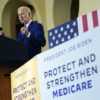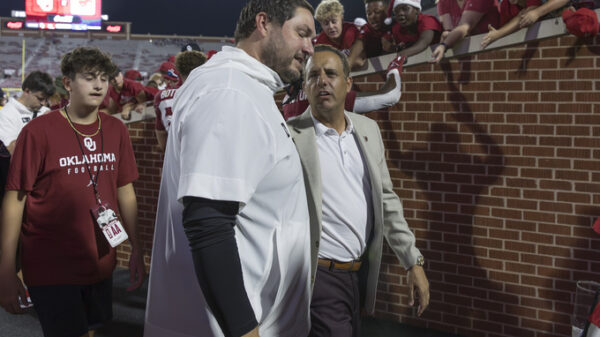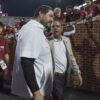PARIS (AP) — When Clarisse Agbégnénou won her sixth world judo title, confirming the reigning Olympic champion as one of the athletes to watch at next year’s Paris Games, the French star’s smallest but greatest fan was less wild about her mother’s newest gold medal than she was about her breast milk.
After a peckish day of few feeds — because mum had been busy putting opponents through the wringer — 10-month-old Athéna made amends that night.
“She didn’t let my boobs out of her mouth,” Agbégnénou says. “I was like, ‘Wow, okay.’ I think it was really something for her.”
Breastfeeding and high-performance sports were long an almost impossible combination for top female athletes, torn for decades between careers or motherhood, because having both was so tough.
But that’s becoming less true ahead of the 2024 Olympics, where women will take another step forward in their long march for equality, competing in equal numbers with men for the first time, and with pioneering super-moms like Agbégnénou showing that it is possible to breastfeed and be competitive.
They don’t pretend that late-night feeds, broken sleep, pumping milk and having to eat for two people are easy. But some female athletes are also discovering that juggling their careers with the rigors of motherhood can pay off with powerful emotional well-being.
Speaking in an interview with The Associated Press, Agbégnénou said she stunned even herself by coming back so quickly from childbirth to win at the worlds in May, with Athéna in tow and expecting to be fed every few hours.
In training, Agbégnénou would stop for quick feeds when Athéna needed milk, nestling her hungry baby in the folds of her kimono, while other athletes in the judo hall paid them no mind, carrying on with their bouts.
“I was sweating on her, poor baby,” she says. “But she didn’t pay attention. She just wanted to eat.”
Women who have breastfed and carried on competing say that support from coaches and sports administrators is essential. Agbégnénou credits the International Judo Federation for allowing her to take Athéna to competitions. IJF officials sounded out other competitors and coaches about whether the baby was a nuisance for them and were told, “’No, she was really perfect, we didn’t hear the baby,’” she says.
“It’s amazing,” she says of her peers’ acceptance and support. “They are part of my fight and I am really proud of them.”
As well as Agbégnénou, three other women also asked and were allowed to nurse their babies at IJF World Tour competitions in the past six years, with arrangements made each time that enabled the moms “to care for the child and to not disturb other athletes’ preparation,” says the governing body’s secretary general, Lisa Allan. She says the IJF is now drawing up specific policies for judokas who are pregnant or postpartum because ”more and more athletes are continuing their careers whilst balancing having a family.”
The Paris Olympics’ chief organizer, Tony Estanguet, says they’re also exploring the possibility of providing facilities for nursing athletes at the Games.
“They should have access to their children — for the well-being of the mothers and the children,” he said in an AP interview. “The status of athletes who are young mothers needs to evolve a bit. We need to find solutions to perhaps make it easier for these athletes to bring babies” into the Olympic village where athletes are housed.
For some breastfeeding athletes, being a pioneer is part of the kick.
Two-time Olympic rowing champion Helen Glover, now aiming for her fourth Summer Games, gave birth to twins at the start of the COVID-19 outbreak, breastfed them and then came out of what she’d intended to be retirement to compete at the pandemic-delayed Tokyo Games in 2021. Glover was the first rower to compete for Britain at the Olympics as a mother.
Glover’s eldest, Logan, lost interest in her milk about the time of his first birthday, but twins Kit and Willow kept feeding to 14 months old. She says that mixing her punishing rowing training with long feeds for two babies was “very draining. It was taking every calorie I had.”
“But I could do it because it was my own time and my own choice,” she says.
“Everyone should have the choice,” Glover adds. “Our bodies … are sometimes very changed through childbirth and pregnancy and breastfeeding. So the answers are never going to be one-size-fits-all. But I think it’s really exciting that these conversations are even being had.”
For some athletes, Milk Stork has also been a help. The U.S.-based transporter ships working moms’ milk when they’re separated from their babies. It says it shipped milk pumped by athletes who competed at the 2021 Paralympic Games in Tokyo and also transported 21 gallons (80 liters) of milk from coaches, trainers and other support staff at the Olympics that year.
The daughter of British archery athlete Naomi Folkard was just 5 1/2-months old and breastfeeding exclusively when her mother traveled to Tokyo for her fifth and final Olympic Games.
Nursing mothers successfully pushed to be able to take babies to those Olympics, held with social distancing and without full crowds because of the coronavirus pandemic. Rather than put her daughter, Emily, through the ordeal of having to live apart from her, in a Tokyo hotel outside of the athletes’ village, Folkard reluctantly left her behind with a large stock of frozen milk. She built that up over months, pumping into the night so Emily wouldn’t go hungry while she was in Japan.
But that created another problem: Because Folkard’s breasts had become so good at making milk, she had to pump regularly at the Games to stop them from becoming painfully swollen. She threw that milk away.
“I was having to get up in the night and pump just because my supply was so much,” she says. “It wasn’t great for performance preparation really. But I did what I had to do to be there.”
And with each drop, progress.
“There’s still a long way to go, but people are talking about it now. Women aren’t retiring to have children. They’re still competing,” Folkard says.
“I feel like things are changing.”
Copyright 2021 Associated Press. All rights reserved.




























You must be logged in to post a comment Login